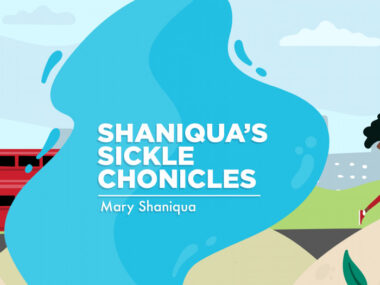Introducing ‘Dear Sickle Cell’: My journey with sickle thalassemia
After transitioning to adult care, I'm now a full-time doctoral student
Written by |

When I was growing up, Beverly Cleary’s “Dear Mr. Henshaw” was one of my favorite books. The novel begins with Leigh, a sixth grader, writing to his favorite author (Boyd Henshaw) for a school assignment and receiving a letter back. The two become pen pals, and through writing letters and journaling, Henshaw helps Leigh explore tough concepts surfacing in his life, such as processing his parents’ divorce, moving to a new city, and making friends in his class.
My goal for “Dear Sickle Cell” is not entirely different from Cleary’s novel. In this column, I’ll discuss managing sickle cell disease as a 20-something, navigating the transition to adult sickle cell care, the mental health impact of the disease, being a full-time doctoral student with a chronic health condition, and so much more. I will be unpacking difficult topics and experiences related to sickle cell disease through writing.
Hi, my name is Michelle. I am 27, was born in Chicago, grew up in Atlanta, and have been slowly working my way up the East Coast since college. I currently live in Washington, D.C., where I study eating disorders and suicidal behavior in adolescents. I love the work that I do and feel lucky that I get to make a small but positive difference in the lives of teens and their families.
In my free time, you can find me traveling with my partner, trying out new coffee shops, practicing yoga, having a movie or reading night with friends, participating in sickle cell advocacy, and most recently, playing tennis. The support of my parents, older sister, partner, and best friends empowers me to make all of this possible.
Growing up with sickle cell
When I was born, my family was not unfamiliar with sickle cell. My mother’s eldest sister had the disease, which led my parents to seek genetic testing, confirming that one of them carried the sickle cell trait and the other the thalassemia trait.
By the time I was born, my parents were not shocked that I was unlucky (but still super chubby and cute) to have the rare sickle beta-zero thalassemia, which I will mostly refer to as sickle thalassemia. This condition is a variant of sickle cell disease and can cause anemia, fatigue, spleen enlargement, higher risk for infections, and pain.
My first episode of acute chest syndrome (ACS) occurred when I was 6 months old, which is where my sickle cell story began. Since then, I have experienced a number of vaso-occlusive crises and ACS events requiring hospitalization. Fortunately, my parents are extremely knowledgeable about my disease and the U.S. healthcare system in general, and therefore have always ensured that I receive great care.
When I left for college at 18, moving to North Carolina and away from my family, I experienced the same challenges that many young adults with sickle cell face. Being fully responsible for my own healthcare for the first time left me feeling anxious and unsure if I could cope — and I was one of the “well-prepared” teens. Experiencing these challenges, even with the support of my family, friends, and great physicians, inspired me to share my story and advocate for improved support during this transition, in the hopes that I can reach sickle cell warriors, caregivers, and providers who might benefit.
I am thrilled to embark on this new journey, and I hope that you continue to join my “Dear Sickle Cell” adventure twice a month. Welcome!
Note: Sickle Cell Disease News is strictly a news and information website about the disease. It does not provide medical advice, diagnosis, or treatment. This content is not intended to be a substitute for professional medical advice, diagnosis, or treatment. Always seek the advice of your physician or other qualified health provider with any questions you may have regarding a medical condition. Never disregard professional medical advice or delay in seeking it because of something you have read on this website. The opinions expressed in this column are not those of Sickle Cell Disease News or its parent company, Bionews, and are intended to spark discussion about issues pertaining to sickle cell disease.




Bamidele Aiyekusibe
By the grace of GOD, Michelle, you shall beat sickle cell. Amen
Just keep on moving forward.
Michelle Harlan
Thank you, Bamidele!
Valerie Roberson
Much academic success! And thanks for sharing your medical journey. I also have sickle cell combined with beta thalassemia and find it difficult to information and sometimes treatment, so I will find your journey of particular interest.
Michelle Harlan
Thank you, Valerie! I'm excited to have you join me.
Shameika McArthur
Hello Michelle, I enjoyed reading about. I have sickle beta thalassemia as well, and some days better than others. I thank God for getting me through the bad days. Continue to be an inspiration.